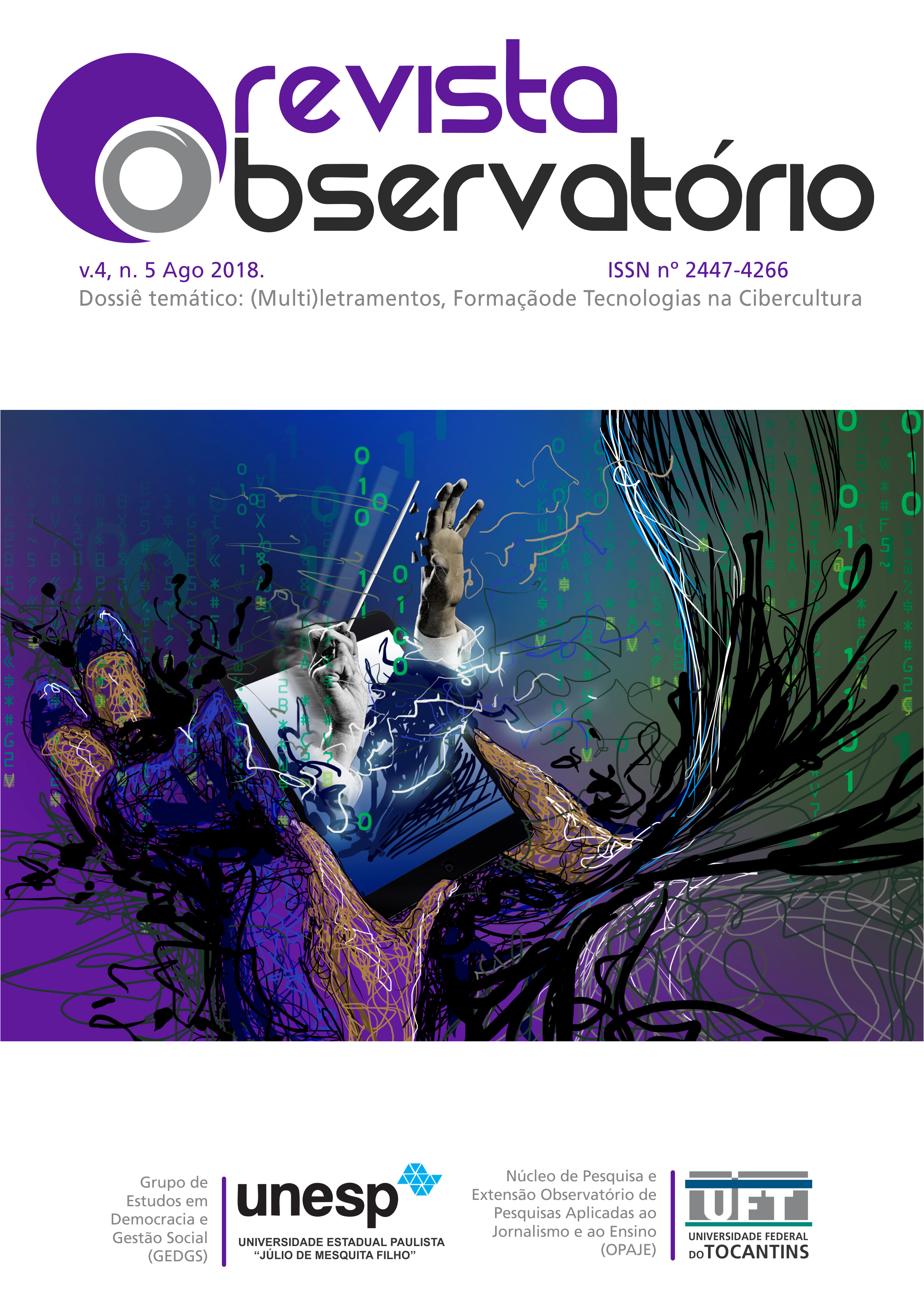DEVELOPMENT OF DIGITAL COMPETENCES AND HYPERCONNECTIVITY. TREND IN POSTGRADUATES TRAINING
DOI:
https://doi.org/10.20873/uft.2447-4266.2018v4n5p716Keywords:
Digital skills, Hyperconnectivity, Conectivism, Collective intelligence, Invisible learningAbstract
This paper offers a review of the concept hyperconnectivity in order to analyze the implementation of digital competences in students and graduates of the Master in Management and Social Development in University of Guadalajara, which can be understood as a strategy of the institution to adopt the guideline proposed by the World Conference on Higher Education within this IES has been implemented. In this way we intend to initiate a discussion about the dialectic of the Knowledge Societies in the context of the Social Sciences and Humanities. The aim of the study is to establish the way in which permanent connection influences in the development of new digital and social skills, which contribute to achieve both the goals of the academic program mentioned before and those proposed by international organizations such as the UN, UNESCO and OCDE.
Downloads
References
CAVAZOS A., J., GAETA G., M. L. La universidad mexicana en la sociedad del conocimiento: desafíos para la inclusión social. Revista panamericana de pedagogía saberes y quehaceres del pedagogo, 21, 121 – 137. 2014. Disponible en: http://biblio.upmx.mx/textos/r0010513.pdf . Acceso el 15 jun. 2017.
COBO ROMANÍ, C., MORAVEC, J. Aprendizaje Invisible. Hacia una nueva ecología de la educación. Col•lecció Transmedia XXI. Barcelona: Laboratori de Mitjans Interactius / Publicacions i Edicions de la Universitat de Barcelona. 2011.
DOWNES, S. An Introduction to Connective Knowledge. En Theo Hug (Ed.) (2007), Media, Knowledge & Education. Exploring new Spaces, Relations and Dynamics in Digital Media Ecologies (pp. 77 – 102). Proceedings of the International Conference held on June 25-26, 2007. Nov 27, 2007. Austria: Innsbruck university press. 2005.
DOWNES, S. Connectivism and Connective Knowledge. Essays on meaning and learning networks. Canada: National Research Council Canada. 20120. Disponible en: http://www.downes.ca/post/58207 . Acceso el 18 jun. 2017.
DUART, J. M., MENGUAL-ANDRÉS, S. Impacto de la sociedad del conocimiento en la universidad y en la comunicación científica. Relieve, 20(2), 1 – 11. DOI: 10.7203/relieve.20.2.4343. Acceso el 15 nov. 2017.
GUTIÉRREZ, A.; GÓMEZ, M. (La educación virtual de posgrado: estudio exploratorio sobre competencias digitales en estudiantes de especialización. Revista de Investigación Educativa de la Escuela de Graduados en Educación, 8(15). 2017. Disponible en: http://rieege.tecvirtual.mx/ . Acceso el 10 dic. 2017.
LÉVY, P. Inteligencia Colectiva. Por una antropología del ciberespacio. Washington, DC.: Organización Panamericana de la Salud. 2004.
MINISTERIO DE EDUCACIÓN, CULTURA Y DEPORTE DEL GOBIERNO DE ESPAÑA. Competencia Digital [página web]. s/f. Recuperado de: https://www.mecd.gob.es/educacion-mecd/mc/lomce/el-curriculo/curriculo-primaria-eso-bachillerato/competencias-clave/digital.html. Acceso el 10 jun. 2017.
ORDORIKA S., I. Educación superior y globalización: las universidades públicas frente a una nueva hegemonía. Andamios, 3(5), 34 – 47. 2006. Disponible en: https://www.uacm.edu.mx/Portals/18/num05/dossier2.pdf . Acceso el 10 jun. 2017.
ORGANIZACIÓN DE LAS NACIONES UNIDAS PARA LA EDUCACIÓN, LA CIENCIA Y LA CULTURA. Conferencia Mundial sobre la Educación Superior: La nueva dinámica de la educación superior y la investigación para el cambio social y el desarrollo. París: UNESCO. 2009.
ORGANIZACIÓN DE LAS NACIONES UNIDAS PARA LA EDUCACIÓN, LA CIENCIA Y LA CULTURA. Hacia las sociedades del conocimiento. París: UNESCO. 2005.
ORGANIZACIÓN PARA LA COOPERACIÓN Y EL DESARROLLO ECONÓMICO. México. Políticas prioritarias para fomentar las habilidades y conocimientos de los mexicanos para la productividad y la innovación. París: OCDE. 2015.
ORGANIZACIÓN PARA LA COOPERACIÓN Y EL DESARROLLO ECONÓMICO. Diagnóstico de la OCDE sobre la estrategia de competencias, destrezas y habilidades de México. Resumen ejecutivo. París: OCDE. 2017.
QUAN-HAASE, A., & WELLMAN, B. Hyperconnected Net Work: Computer-Mediated Community in a High-Tech Organization, En Charles Heckscher and Paul S. Adler (Eds.) The Firm as a Collaborative Community Reconstructing Trust in the Knowledge Economy (pp. 281 – 333). Oxford: Oxford University Press. 2007.
QUAN-HAASE, A., SUÁREZ, J. L., BROWN, D.M. Collaborating, Connecting, and Clustering in the Humanities: A Case Study of Networked Scholarship in an Interdisciplinary Dispersed Team. American Behavioral Scientist, 59(5), 565-581. 2015. DOI: 10.1177/0002764214556806
REIG, D., VÍLCHEZ, L. Los jóvenes en la era de la hiperconectividad: tendencias, claves y miradas. Madrid: Fundación Telefónica. 2013.
ROIG, R.; RODRÍGUEZ-CANO, C.; FLORES, C.; ÁLVAREZ, J.; BLASCO, J.; GRAU, S.; GUARINOS, I.; LLEDÓ A.; LÓPEZ, E.; LORENZO, G.; MARTÍNEZ, M.; MENGUAL, S.; PERANDONES, T.; SÁNCHEZ, F.; TORTOSA, M. Evaluación de las Competencias Digitales del alumnado en el Espacio Europeo de Educación Superior. En TORTOSA YBÁÑEZ, M.T., GRAU COMPANY, S. y ÁLVAREZ TERUEL, J.D. (Coords.), X Jornadas de Redes de Investigación en Docencia Universitaria: Investigación, innovación y enseñanza universitaria: enfoques pluridisciplinares (pp. 781-795). 2012. Disponible en: https://rua.ua.es/dspace/handle/10045/24277 Acceso el 15 jul. 2017.
SANABRIA, A. y HERNÁNDEZ, C. M. Percepción de los estudiantes y profesores sobre el uso de las tic en los procesos de cambio e innovación en la enseñanza superior. Revista de Psicologia, Ciències de l’Educació i de l’Esport, 29, 273 - 290. 2011. Disponible en: http://www.revistaaloma.net Acceso el 15 jul. 2017.
SIEMENS, G. Connectivism: a learning theory for the digital age. International Journal of Instructional Technology & Distance Learning, 2(1). 2005. Disponible en: http://www.itdl.org/journal/jan_05/article01.htm Acceso el 15 jun. de 2017.
TAPASCO, O. A., y Giraldo, J. A. Estudio Comparativo sobre Percepción y uso de las TIC entre Profesores de Universidades Públicas y Privadas. Formación Universitaria, 10(2), 3 – 12. 2017. DOI: 10.4067/S0718-50062017000200002
TRANSUE, B. M. Connectivism and Information Literacy: Moving From Learning Theory to Pedagogical Practice, Public Services Quarterly, 9(3), 185-195, 2013. DOI: 10.1080/15228959.2013.815501
WATERS, D. Hyper-connected generation rises. BBC News website. 09 de mayo de 2007. Disponible en: http://newsvote.bbc.co.uk/mpapps/pagetools/print/news.bbc.co.uk/1/hi/technology/6637865.stm Acceso el 20 oct. 2017.
WHITE, D., LE-CORNU, A. Visitors and Residents: A new typology for online engagement. First Monday, 16(9). 2011. Disponible en: http://firstmonday.org/ojs/index.php/fm/article/view/3171/3049 Acceso el 20 oct. 2017.
Downloads
Published
How to Cite
Issue
Section
License
[PT] Autores que publicam nesta revista concordam com os seguintes termos:
1. Autores mantém os direitos autorais e concedem à revista, sem pagamento, o direito de primeira publicação, com o trabalho simultaneamente licenciado sob a Creative Commons Attribution License (CC BY-NC 4.0), permitindo o compartilhamento do trabalho com reconhecimento da autoria do trabalho e publicação inicial nesta revista.
Leia todos os termos dos direitos autorais aqui.

